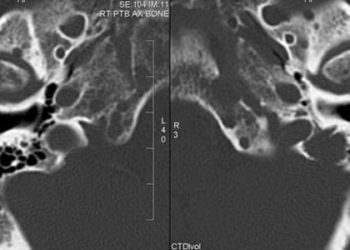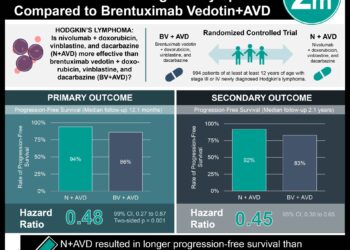Idelalisib may be effective in treating relapsed indolent lymphoma [DELTA Study]
Image: PD
1. Idelalisib demonstrated a clinical response to treatment in 57% of patients with indolent non-Hodgkin’s lymphomas.
2. Adverse events were common, but overall tolerability to idelalisib was similar to alternative chemotherapy regimens.
Evidence Rating Level: 2 (Good)
Study Rundown: This phase II trial aimed to demonstrate the efficacy of idelalisib in the treatment of relapsed indolent lymphomas. Idelalisib is a potent small-molecule inhibitor of the delta isoform of phosphatidylinositol-3-kinase (PI3Kδ). PI3K is a lipid kinase integral to the pathways of cell proliferation and survival. PI3K comes in 4 isoforms, with the delta isoform being the most essential in B-cells. Targeting PI3K with a selective inhibitor is an attractive means for treating B-cell malignancies. This phase II clinical trial demonstrated an overall response rate of 57%. However, this study had no control group for comparison, and so the authors relied on objective data looking at tumor size and progression-free survival to determine efficacy. The study was appropriately powered to demonstrate a response rate of greater than 39%. 25% of the patients in this trial had to discontinue treatment due to adverse events, however the toxicity profile was somewhat complimentary to other agents suggesting the potential for future combination regimens. A larger, controlled trial would be the next step in the development of idelalisib as a therapy against indolent non-Hodgkin’s lymphoma that does not respond to currently available therapies. This trial was sponsored primarily by Gilead, the producer of idelalisib.
Click to read the study, published today in NEJM
Click to read an accompanying editorial in NEJM
Relevant Reading: Idelalisib is active in relapsed and refractory indolent lymphoma
In-Depth [phase II, uncontrolled clinical trial]: The authors enrolled 125 patients with relapsed, indolent non-Hodgkins lymphoma (NHL) from multiple centers between 2011 and 2012. Patients were eligible if they had confirmed B-cell indolent NHL which was refractory to rituximab and an alkylating agent, and had radiographically measurable disease. Patients were then given idelalisib at a dose of 150 mg twice daily and monitored clinically with physical examination, laboratory testing, and CT imaging at predetermined intervals. The primary endpoint was overall rate of response, which was assessed by an independent review committee. Secondary endpoints included progression-free survival. Seventy-one of the 125 patients demonstrated a clinical response with an overall response rate of 57% (95% CI, 48 to 66). There was no significant difference in response rates between tumor subgroups. Additionally, the mean progression-free survival was 11 months. Adverse events occurred in 82% of patients with the most common being diarrhea, marrow suppression, and elevated transaminases. Discontinuation of the study drug due to adverse events occurred in 25 patients.
More from this author: Pneumocystis linked to sudden infant deaths, Continuous infusion of beta-lactams may be superior to bolus therapy, Novel antiviral drug reduces influenza viral load, Three months of antibiotics appear to effectively treat early-onset spinal implant infections
©2012-2014 2minutemedicine.com. All rights reserved. No works may be reproduced without expressed written consent from 2minutemedicine.com. Disclaimer: We present factual information directly from peer reviewed medical journals. No post should be construed as medical advice and is not intended as such by the authors, editors, staff or by 2minutemedicine.com. PLEASE SEE A HEALTHCARE PROVIDER IN YOUR AREA IF YOU SEEK MEDICAL ADVICE OF ANY SORT.







